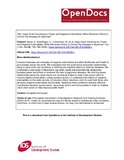Value Chain Governance, Power and Negative Externalities: What Influences Efforts to Control Pig Diseases in Myanmar?
Date
2019-11-22Author
Ebata, Ayako
MacGregor, Hayley
Loevinsohn, Michael
Su Win, Khine
Tucker, Alexander
Metadata
Show full item recordImpact
Abstract
Livestock diseases are examples of negative externalities that affect livelihoods and health of poor people across the world. We investigate how the governance and power relationships along a value chain can contribute to reducing the negative effects of livestock diseases. We conducted a case study of Myanmar’s pig value chains and examined the relationship between power and efforts to minimize the risks of pig-borne diseases. We find that power relationships along the value chains are not directly linked to value chain actors’ effort to control negative externalities, unless powerful actors (1) understand the effects of negative externalities on the wider society, (2) monitor others’ practices, and (3) could hold those who generate negative externalities accountable. Satisfying these conditions requires effective coordination between governments, value chain actors and civil societies in order to mobilize value chain actors to help improve public health.
Citation
Ebata, A.; MacGregor, H.; Loevinsohn, M.; Su Win, K. and Tucker, A. (2019) 'Value Chain Governance, Power and Negative Externalities: What Influences Efforts to Control Pig Diseases in Myanmar?', The European Journal of Development Research, https://doi.org/10.1057/s41287-019-00239-xDOI
10.1057/s41287-019-00239-xIs part of series
The European Journal of Development Research;2019 p1-22Rights holder
© European Association of Development Research and Training Institutes (EADI) 2019Collections
- Journal Articles - External [429]
- IDS Research [1671]

